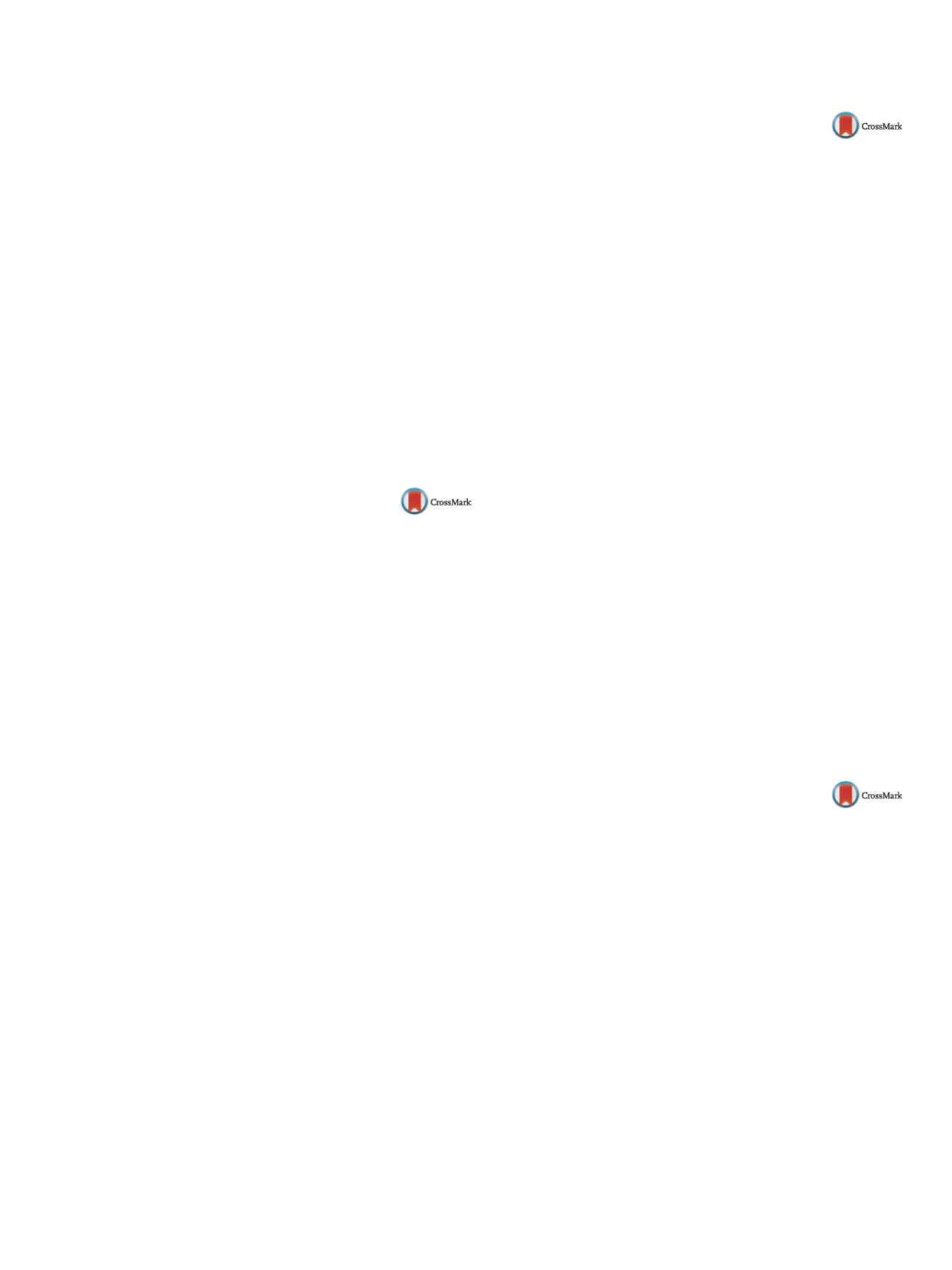

25th European congress of psychiatry / European Psychiatry 41S (2017) S365–S404
S371
and suicidal behavior in psychosis. Although clozapine is associ-
ated with a low likelihood of extrapyramidal symptoms and other
neurological side effects, weight gain and metabolic side effects are
well known in clinical practice exposing the patient to a greater risk
of cardiovascular disorders, premature death, as well as psychoso-
cial issues leading to non-adherence. The mechanisms underlying
this pharmacologically activated disorders are still controversial.
Based on our in vitro results, we have characterized in vivo the
effects of the selective PKC inhibitor, Ruboxistaurin (LY-333531)
on a preclinical model of long-term clozapine-induced weight gain.
Cell biology, biochemistry and psychomotor tests have been per-
formed on wild type and PKC (-/-) mutant mice to investigate the
contribution of endogenous PKC and its pharmacological inhibitor
on the neuroleptic effect of clozapine. Lastly, we also shed light on
a novel aspect of the mechanism underlying of clozapine-induced
weight gain, demonstrating that the clozapine-dependent PKC
activation promote the inhibition of the lipid droplet-selective
autophagy process, opening the way to new therapeutic interven-
tion approach.
Disclosure of interest
The authors have not supplied their decla-
ration of competing interest.
http://dx.doi.org/10.1016/j.eurpsy.2017.02.381EW0768
Changes in the cytokine profile in first
episode, drug-naïve patients with
psychosis after short-term
antipsychotic treatment
P. Petrikis (Lecturer in psychiatry)
1 ,∗
, P. Voulgari
2, V. Boumba
3,
D. Archimandriti
2, P. Skapinakis
4, V. Mavreas
41
Department of Psychiatry, Ioannina, Greece
2
Ioannina School of Medicine, Department of Internal Medicine,
Ioannina, Greece
3
Ioannina School of Medicine, Laboratory of Internal Medicine and
Toxicology, Ioannina, Greece
4
Ioannina School of Medicine, Department of Psychiatry, Ioannina,
Greece
∗
Corresponding author.
Introduction
An increasing body of evidence suggests that
antipsychotic medication can cause immunological changes that
could be attributed to the amelioration of psychotic symptoms or
the metabolic side effects of the drugs. So far, the results of the
studies remain controversial.
Objective
Our aimwas to compare the levels of interleukin (IL) IL-
2, IL-6 and transforming growth factor- 2 (TGF- 2) in drug-naïve,
first-episode patients with psychosis before and after six weeks of
antipsychotic medication.
Methods
Thirty-nine first episode patients with psychosis were
enrolled in the study. Serum levels of IL-2, IL-6 and TGF- 2 were
measured by enzyme linked immunosorbent assay (ELISA) before
and six weeks after the initiation of antipsychotic medication. In
addition, clinical psychopathology was assessed using Positive and
Negative Syndrome Scale (PANSS) before and after treatment.
Results
Serum levels of IL-2were significantly higher in the study
group six weeks after the initiation of antipsychotic treatment
(
P
< 0.001) while TGF- 2 levels were decreased (
P
< 0.001) and IL-6
levels were slightly reduced (
P
< 0.004).
Conclusion
The changes in cytokine levels may be attributed to
the action of antipsychotic medication and the remission of psy-
chopathology. The reduction in TGF- 2 levels is observed in all
patients and with all antipsychotic medications used. TGF- 2 may
be a marker of clinical efficacy.
Disclosure of interest
The authors have not supplied their decla-
ration of competing interest.
http://dx.doi.org/10.1016/j.eurpsy.2017.02.382EW0769
Amelioration of impaired
hippocampal cognitive performance
in Alzheimer’s disease via long-term
intervention with ghrelin
B. Sadeghi
Shahid Beheshti University of Medical Sciences, Physiology,
Neuroscience Research Center, Tehran, Iran
Introduction
Alzheimers disease (AD) is a neurodegenerative dis-
order characterized by loss of memory and cognitive deficits.
Ghrelin is a peptide hormone which has been linked to neuropro-
tection, memory and learning processes.
Objectives
This study investigated the effects of ghrelin-induced
memory retention on amelioration of cognitive deficits via restora-
tion of long-term potentiation (LTP) and induction of synaptic
plasticity in hippocampal CA3, using a rat model of AD induced
by amyloid- (1-42) injection.
Methods
Five groups of male rats (230–270 g) including ghrelin-
treated (200 ng/rat, [ICV], daily for two weeks), A 1-42 injected
(5 L/rat) and A 1-42 plus ghrelin-treated animals were designed.
Ghrelin was administered after an ICV injection of A 1-42. To
assess cognitive performance and the motor dysfunction, passive
avoidance tests and open-field were performed, respectively. Step-
through latency (STL) was evaluated as learning andmemory index.
Intrahippocampal field potential recordings were done.
Results
Results showed that following A 1-42 injection, STL and
induction of LTPwere significantly decreasedwhereas ICV injection
of ghrelin significantly enhanced memory retention by improve-
ment of STL and restitution of LTP in the CA3 with increased EPSP
slope and PS amplitude, suggesting the involvement of ghrelin in
postsynaptic mechanisms of hippocampal LTP.
Conclusions
It was revealed that neuroprotective effects of
chronic ghrelin not only can enhance but also can restore LTP in
the CA3 area in A -induced AD. Results suggest that ghrelinmay be
considered as a promising therapeutic agent to alleviate cognitive
deficits of AD.
Disclosure of interest
The author has not supplied his/her decla-
ration of competing interest.
http://dx.doi.org/10.1016/j.eurpsy.2017.02.383EW0770
Relationship between taste thresholds
and antidepressant response:
Preliminary findings
S. Srivastava
1 ,∗
, A. Kumar
1, V. Agarwal
2, P. Chubey
1,
L. Donaldson
3, J. Potokar
41
King George’s Medical University, Geriatric Mental Health,
Lucknow, India
2
King George’s Medical University, Postgraduate Department of
Psychiatry, Lucknow, India
3
University of Nottingham, Faculty of Medicine and Health Sciences,
Nottingham, United Kingdom
4
University of Bristol, Department of Community Medicine, Bristol,
United Kingdom
∗
Corresponding author.
Introduction
In healthy volunteers, light acting through sero-
tonin pathways, decreases the threshold for sweet, but not salt
taste; similar to SSRI paroxetine. In depressive disorders, there
is deficiency of serotonin throughput, which is remedied by SSRI
medications, and results in improvement in symptoms of depres-
sion. Thus, we report on taste thresholds before and after SSRI
treatment.
Objectives
To study the variation in thresholds for sweet with
SSRI treatment in depressed patients in short- and long-term.


















